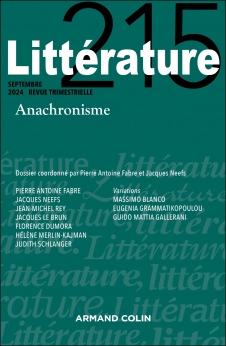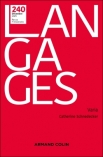
LITTÉRATURE Nº215 (3/2024)
Pour acheter ce numéro, contactez-nous
Recevez les numéros de l'année en cours et accédez à l'intégralité des articles en ligne.
Jacques Le Brun s’intéressait dans le dernier livre publié de son vivant au Pèlerin chérubinique d’Angelus Silesius, publié en 1657. Il y était sensible à la manière dont cet écrit, tardif dans la littérature spirituelle du XVIIe siècle, se donnait comme un traité poétique qui cependant faisait revenir les grands problèmes théologiques qui avaient habité les décennies antérieures. Dans la contribution que nous republions aujourd’hui, quatre ans après sa mort en 2020, Jacques Le Brun mettait en oeuvre un retournement de cet anachronisme, en montrant comment cet ouvrage très largement glosé au XXe siècle portait en lui-même, peut-être parce qu’il était déjà tardif, les germes de sa renaissance posthume ; comme si le « trop tard » était devenu un « trop tôt », comme si le dernier chant devenait inaugural pour une époque dans laquelle le passé théologique de l’histoire occidentale venait à être redécouvert. La présentation de cette contributionmet en évidence la manière dont Jacques Le Brun faisait vivre avec une acuité particulière, quelques mois avant sa mort, l’une des préoccupations les plus intenses de la dernière période de son activité, qui avait déjà marqué de grands livres antérieurs, celle de concevoir une pensée essentiellement anachronique à l’oeuvre dans l’histoire du christianisme, doublement travaillé par la recherche de ses origines et l’imminence de sa disparition.
In the last book published during his lifetime, Jacques Le Brun was interested in Angelus Silesius’ Cherubic Pilgrim, published in 1657. He was sensitive to the way in which this writing, late in the spiritual literature of the 17th century, was presented as a poetic treatise that nonetheless brought back the great theological problems that had inhabited the preceding decades. In the contribution we are republishing today, four years after his death in 2020, Jacques Le Brun turned this anachronism on its head, showing how this work, so widely glossed in the twentieth century, carried within itself, perhaps because it was already late, the seeds of its posthumous rebirth ; as if the “too late” had become a “too early”, as if the last song had become inaugural for an era in which the theological past of Western history was being rediscovered. The presentation of this contribution highlights the way in which, a few months before his death, Jacques Le Brun brought to life with particular acuity one of the most intense preoccupations of the last period of his activity, which had already marked major earlier books : that of conceiving an essentially anachronistic thought at work in the history of Christianity, doubly shaped by the search for its origins and the imminence of its disappearance.

